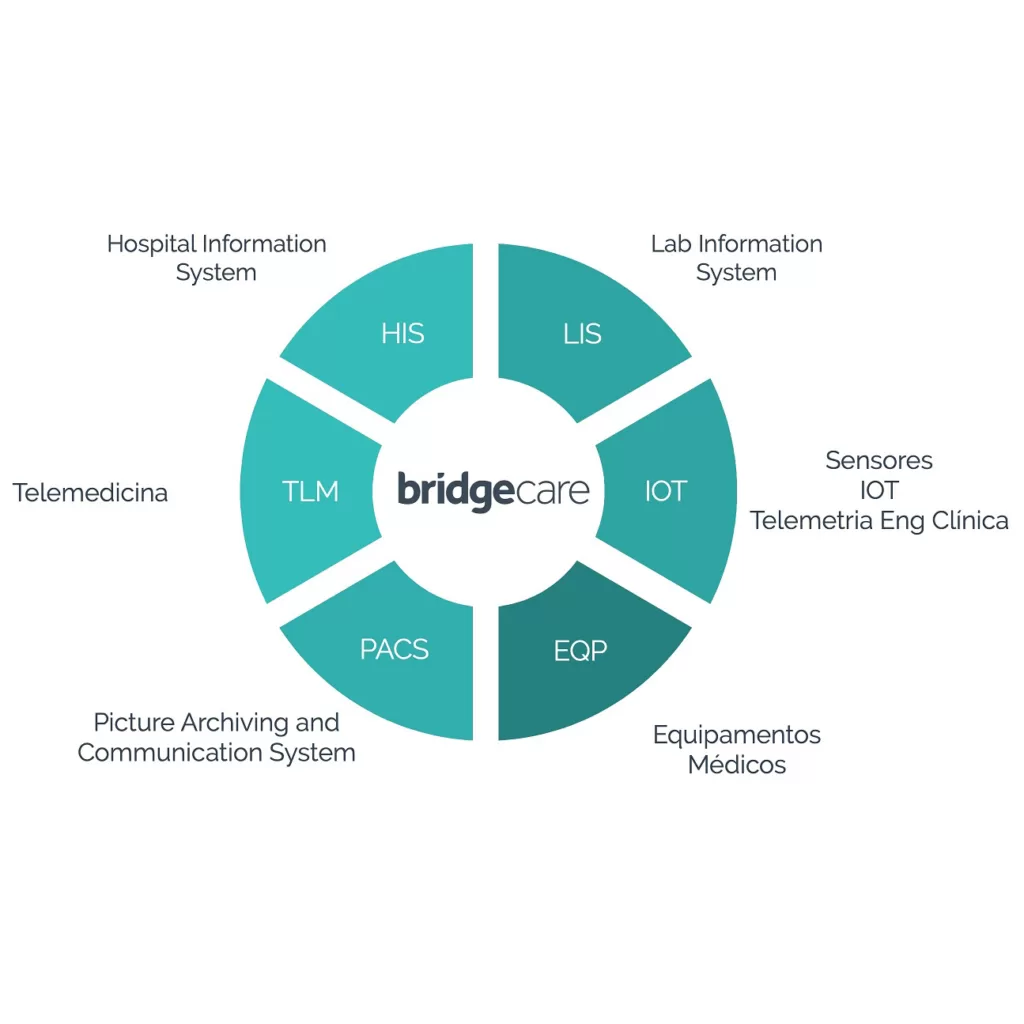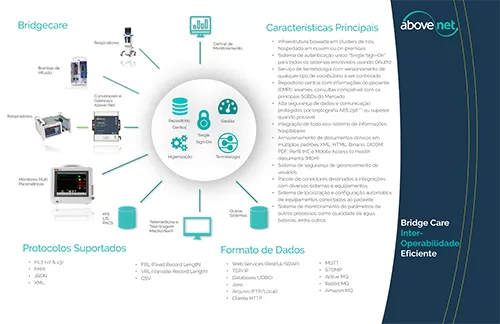Intelligent Integration of Healthcare Systems

Health Interoperability Platform
Technology and ease of system connections
There is a growing demand for information management in hospital environments, with data coming from diverse sources. This hinders unified communication, increases system load, and creates incompatibility between data points.
To improve information processing and interoperability, healthcare organizations need to ensure that relevant data is available and synchronized across all systems within a hospital or a network of hospitals.
Bridgecare is a platform capable of integrating information from various distinct systems into a single central repository and sharing it in various existing formats and protocols, bridging multiple technologies.
The platform also offers important services in information management, such as: Database Cleansing, Unified Login Service, Terminology, IoT for infrastructure, clinical engineering and equipment, among others.


Benefits of Bridgecare
The variety of systems and equipment in hospitals, and the resulting need for interoperability, make point-to-point connectivity in both patient care and organizational environments impossible. Furthermore, the volume of information, the diversity of protocols, and the format of communications render management by the hospital's IT team unfeasible.
The problem worsens when the healthcare organization has several decentralized service points and bases, resulting in multiple registrations and lost information.
The Bridgecare platform offers services that address these problems faced by healthcare organizations in a simple and robust way, optimized for IT processes and improving the quality of the organization's information.
Bridgecare acts as a central repository for all information, supporting various communication protocols and capable of translating messages from major formats into industry-standard formats. Furthermore, the platform integrates equipment, measurements, and sensors, providing visibility and integrated management for clinical engineering, hospital maintenance, and administration.
Proven Reliability
Bridgecare® interoperates with over 70 systems on the market and is present in more than 700 locations in Brazil. Hundreds of thousands of pieces of information are processed and cleaned per hour. Furthermore, Bridgecare® already has the largest patient database in Latin America and one of the largest in the world, all within a single system.
These indicators, along with an availability of 99.9999%, demonstrate the robustness and reliability of the platform.
Millions of Patients
Millions of Customer Service Requests
Millions of Exam Results
Millions of Dispensations
Millions of Pregnancy and Prenatal Exams
Supported Data Formats
- Web Services (Restful/SOAP)
- TCP/IP
- Database (JDBC)
- JAVA
- File (FTP/Local)
- HTTP client
- MQTT
- STOMP
- Active MQ
- Rabbit MQ
- Amazon MQ
Supported Clinical Documents
- XML
- HTML
- Binary
- DICOM
- IHE
- MDH
Supported Protocols
- HL7 (V2 & V3)
- FHIR
- JSON
- XML
- FRL (Fixed Record Length)
- VRL (Variable Record Length)
- CSC
Features
Bridgecare goes beyond interoperability in healthcare. The platform was designed to add intelligence and proactivity to the resolution of problems anticipated through notifications
HIS/LIS/PACS Integration
All electronic medical records, as well as information from laboratory and imaging exams, are connected to the central repository in a sanitized manner.
Integrations with Other Systems
The platform integrates with over 70 healthcare systems, including telemedicine, teletriage, and electronic health records, enabling the optimization of care within a single information environment.
Single Sign-On Service
Bridgecare offers an encrypted security service for single sign-on and user management, simplifying and reducing the cost of managing users across various systems with different security levels. This way, all employees of the institution receive a single username and password for identification regardless of the type of access or system used
Equipment Location and Configuration
Bridgecare offers a telemetry service with automatic configuration of bed-associated equipment, eliminating the need for reconfiguration each time the device is moved within the hospital. The system also automatically reports the location to clinical engineering, facilitating the management and technical support of these items.
Interoperability with Equipment
Bridgecare offers native integration with any medical device using modern transmission protocols such as HL7 or even legacy text formats. Through proprietary technology, device locations are automatically identified. All information is transmitted to the central repository for use by other systems within the institution.
Telemedicine
The platform integrates with several other systems, including the MedKortex® Telemedicine and Tele-triage systems, allowing for the maximization of care within a single information environment, independent of the number of units or the geographic distribution of the network.
COGNILINK Smart Terminology
Bridgecare offers a customizable and parameterizable Intelligent Terminology Service, with versioning of all technical terms used in applications, according to the data quality control indicated by the institution.
IIoT Monitoring and Infrastructure
The Bridge family has a tradition in Industrial Internet of Things and incorporates into Bridgecare the monitoring of equipment, infrastructure, or quality process parameters of the institution. Intelligent automatic monitoring of water quality, reservoir levels, tank pressures, cylinder charges, medical IT, and asset location are just some of the automatic measurements that the system performs to increase the safety and efficiency of the operation. Based on programmed alarms and operating rules, Bridgecare alerts in real time to any problem in equipment vital to the operation and safety of the hospital.
Database Cleansing
The platform monitors the database for duplicate records, homonyms, and conflicting information in a customized way. Through system configuration, the administrator can select intelligent rules so that the cleaning service indicates alarms and points of attention for analysis and action on the portal.
Integration Quality Index
Bidgecare constantly monitors the integration quality of legacy systems and indicates the integration quality (IQ) of each system on intuitive dashboards. The platform also notifies the administrator in case of unexpected changes in integration behavior. This allows the administrator to directly address the institution's management regarding the quality of data transfer for the benefit of the repository.
IoT Clinical Engineering
Through the interoperability of Bridgecare and experience in industrial IIoT (Industrial Internet of Things) applications with Bridgemeter, Above-Net offers an integrated instrumentation, monitoring, and communication solution for infrastructure equipment capable of monitoring and alerting clinical engineering about changes in readings of parameters critical to operation.
Bridgecare predictively identifies degradation in readings from any equipment for preventive action based on operating conditions, avoiding unnecessary expenses for replacing parts in good condition or the risk of downtime due to lack of maintenance.
Some IoT Monitoring Applications Bridgecare
- Cold Storage
- Medical Gas Networks
- Medical IT
- Equipment Location and Tracking
- Cylinder Battery (Backup reserve)
- Energy Management
- Water Consumption Management
- Generator Sets
- Medical Air Systems
- Refrigeration Systems
Maintenance Workflows
Predictive rules and alarms can trigger maintenance workflows for portable equipment with a dynamic checklist of actions and maintenance tasks to be performed by the responsible team. Based on the feedback collected from these devices, the system dynamically indicates the next steps to correct the problem according to the workflow defined by the institution.
Architecture
Bridgecare has a modular architecture capable of meeting the growing integration demands according to each client's maturity. Through available modules and connectors, the system can be configured for any type of solution.
Each connector is responsible for receiving, transmitting, and transforming information from its original format to the repository or vice versa using Web Services (Restful/SOAP), TCP/IP, FTP, among others. The basic package includes the central repository with a web-based management system and three main connectors dedicated to connecting HIS (Hospital Information System), LIS (Laboratory Information System), and PACS (Picture Archiving and Communication System), configured according to the minimum desired dataset.

The Single Sign-on security module offers a centralized way to authenticate a single user via OAuth2 for all integrated systems and platforms, with full profile configuration for real-time application permission authentication.
Another important module is the terminology service, used for standardizing terms across integrated applications and defined by the platform's management team.
The next module is designed for connecting equipment, capable of capturing, transmitting, and storing information in HL7 or proprietary protocols from patient equipment measurements, making them available in the central repository for consumption by other systems.
Through this same connector, the platform is able to locate the equipment, whether via wired or wireless connection, informing clinical engineering about its movement and automatically associating it with hospital beds.
The module also offers connectivity with sensors, control centers, and measuring equipment, and is capable of capturing parameters from gas systems, fire systems, water quality, alerting against leaks, and detecting incorrect pressure values. This allows the repository to be fed with information fundamental to supply logistics and to the maintenance team, enabling predictive analysis of the failure of various equipment and systems.
Bridgecare also offers, in all its configurations, a notification system (Dashboard and Email) capable of providing real-time alerts about the services and conditions of all monitoring performed. Notifications utilize real-time messaging systems such as STOMP, ActiveMQ, RabbitMQ, and AmazonMQ. Connectors for integration with Telemedicine and Clinical Decision Support systems are also available and can be added to any package. All information and logs are stored in a scalable AWS database or locally on-premises, according to each client's needs.
Each connector is responsible for receiving, transmitting, and transforming information from its original format to the repository or vice versa using Web Services (Restful/SOAP), TCP/IP, FTP, among others. The basic package includes the central repository with a web-based management system and three main connectors dedicated to connecting HIS (Hospital Information System), LIS (Laboratory Information System), and PACS (Picture Archiving and Communication System), configured according to the minimum desired dataset.
Other Features
Whether hosted on AWS Web or on-premises, Bridgecare offers a flexible and scalable node cluster-based infrastructure.
Available for connections with SSL/TLS encryption for both sending and receiving information, and can be configured for integrations using TCP/IP, FTP, and HTTP protocols.
All communication used by Bridgecare supports AES256 or higher communication whenever possible.
The authentication service is compatible with the most stringent security levels and allows for profile configuration through the individual selection of actions and read/write permissions in various areas. This feature allows for the configuration of unlimited levels of access for different team members with the same security shared by the centralized Single Sign-On service with OAuth2 authentication.
Bridgecare offers a range of native connectors capable of translating messages through mathematical, logical, interactive calculations, or two-way translation tables. Therefore, regardless of the application's data format, Bridgecare receives and transmits the information, translating it to the repository's standard in a secure and reliable manner.
Redundant systems and equipment can ensure high availability for installations of any size, whether on-premises or in the cloud, through this optional service.
The system offers connection options via RESTful or SOAP web services.
This functionality allows for the capture of information using any communication protocol, regardless of density or parameter type, enabling the complete optimization of information in a structured way. Clinical engineering can have instant access to data critical to hospital operation and anticipate critical operational problems.
All information regarding operations performed in Bridgecare is recorded and updated using encryption and is available for historical searches using keywords or search criteria within the platform's management environment.
The platform offers multiple storage standards for clinical documents, including but not limited to XML, HTML, Binary, DICOM, PDF, IHE Profile, and Mobile Access to Health Documents (MDH).
Advantages

Centralized Information
The Bridgecare repository provides the most complete patient record database to all integrated systems.

Reducing IT Calls
Bridgecare reduces the number of calls through intelligent single sign-on services.

Unified Repository
It allows centralized access for audits and studies of medical records in a unified and structured way from the sanitized patient database.

Connection to Equipment
The Bridgemeter IoT has low operating and deployment costs and can be installed in hundreds of locations, providing access to your company's customers.
Contact Us
Request a quote or more information using the form below. Our project managers are ready to offer consulting and assistance in specifying the Hospital Integration and Interoperability platform for your hospital network.





